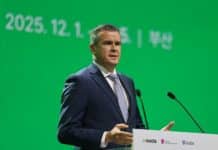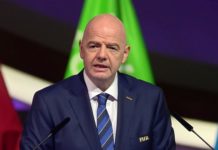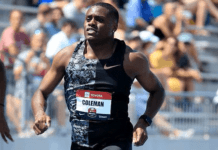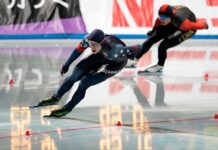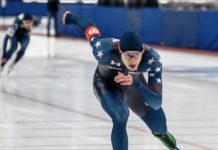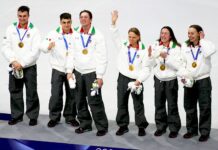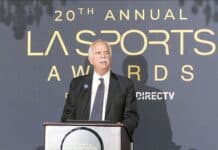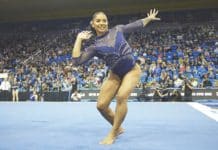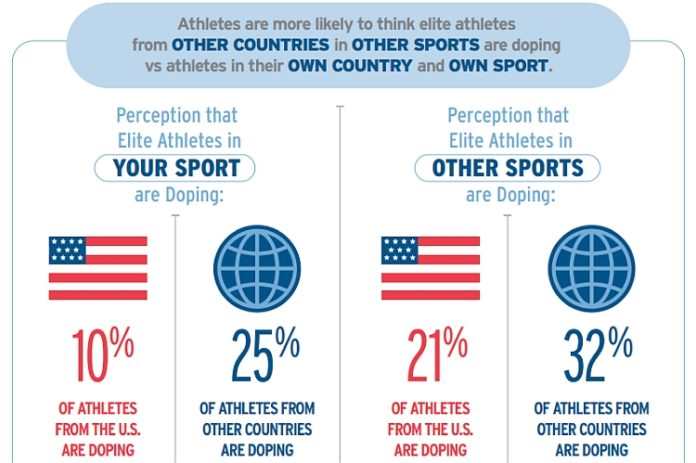★ The Sports Examiner: Chronicling the key competitive, economic and political forces shaping elite sport and the Olympic Movement.★
★ To get The Sports Examiner by e-mail: sign up here! ★
≡ THE 5-RING CIRCUS ≡
1. IOC says FIE re-admission of Russia not about 2024
2. USADA survey: 25-32% of foreign athletes are doping
3. Paris 2024 public transport plan: do as you are told
4. FIFPro survey showed 11% in favor of winter World Cup
5. Korea’s Seoul looking for 2036 Olympic bid, but without Pyongyang
The International Olympic Committee continues to defend its “exploration” of possible returns to competition for Russian and Belarusian athletes, and actions in favor of that position by International Federations, but says Paris 2024 eligibility has not yet been discussed. It urged governments to stay out of sports, even though governments often pay most of the expenses for their National Olympic Committees. A U.S. Anti-Doping Agency survey done in 2022 showed that American athletes think a quarter of foreign athletes in their own sport are doping, and up to a third in other sports. The survey noted that the biggest deterrent to doping is still sanctions and bans. In Paris, the regional transit authority told a Sunday news conference that 15% more trains will be added to the system for the 2024 Games and that spectators should follow instructions to go to events and not do as they normally would in Paris. It also wants the attendance for the Opening on the Seine to be limited to 500,000 people due to the transport capacity from the site. A small survey of players who competed in the 2022 FIFA World Cup in Qatar showed overwhelming aversion to another “winter” World Cup, with just 11% in favor. Players also complained about too little prep time with their national teams and not enough recovery time when rejoining their clubs. The mayor of Seoul, Korea said a bid for the 2036 Olympic Games is in the works, but without any ties to North Korea, ending any symbolic “peace mission” via the Games.
● Panorama: Memorabilia ($1.51 million so far for ‘84 Louganis gold) = Athletics (3: Dick Fosbury passes at 76; Chepngetich repeats in Nagoya; Aregawi no. 2 10 km ever in Spain) = Baseball (World Baseball Classic) = Football (Berhalter cleared in inquiry) = Skiing (challenge to FIS Presidential election withdrawn) = Swimming (Ledecky gets U.S. record in short-course 1,650 yards) = Water Polo (U.S. plays Italy for title in World Cup Group A) ●
1.
IOC says FIE re-admission of Russia not about 2024
“The IOC has taken note of the FIE decision. The consultations with all the stakeholders of the Olympic Movement – the athlete representatives, the 206 National Olympic Committees and the International Federations – as part of the democratic decision-making process, are still ongoing.
“In this context it is important to note that participation in the Olympic Games Paris 2024 is not part of the discussions, which are instead focused on the upcoming international competitions, for which the IFs have the sole authority. We also note that, with regard to the conditions for participation in international competitions, the FIE refers to the respective IOC recommendations.”
The International Olympic Committee’s continuously-expanding Q&A on solidarity with Ukraine, sanctions against Russia and Belarus, and the status of athletes from these countries was appended on Monday with two new sections dealing with last week’s vote by the International Fencing Federation (FIE) to re-admit Russian and Belarusian athletes, subject to the IOC’s recommendations and on British Digital, Culture, Media and Sport Secretary Lucy Frazer sending letters to IOC sponsors to enlist their help in keeping Russian and Belarusian athletes out of international competitions.
The IOC has previously stated in the same document, “No decision has been taken on the participation of athletes with a Russian or Belarusian passport at the Olympic Games Paris 2024,” but the pathway is clear. The IOC continuously cites the recommendations of two volunteer “reporters” of the United Nations Human Rights Council for the need to make sure that Russian and Belarusian athletes are not inconvenienced by the war being waged against Ukraine.
The new reply to Frazer’s letter to Olympic sponsor demonstrates this with clarity, including:
“It is not up to governments to decide which athletes can participate in which international competitions. This would be the end of world sport as we know it today. …
“In accordance with how sport is organised around the world and with the Olympic Charter, it must be the sole responsibility of sports organisations to decide which athletes can take part in international competitions based exclusively on their sporting merit. In accordance with this, Olympic sponsors are not involved in this decision-making process.”
Notwithstanding intervening events, the Russian/Belarusian question will be a focus point for the upcoming IOC Executive Board meeting on 28-30 March, along with the status of the International Boxing Association and boxing on the Paris 2024 sports program.
2.
USADA survey: 25-32% of foreign athletes are doping
The U.S. Anti-Doping Agency released the highlights of a fascinating survey taken last May by 994 American athletes across 76 different sports on views of doping, the anti-doping experience and the work of the USADA. Some of the findings:
● 92% support the USADA’s mission against doping and 87% said “USADA’s results management and adjudication process is fair”
● 64% reported that sanctions were the most effective personal deterrent to doping. 18% cited the risk of detection and 18% said education was most helpful. Asked about their sport in general, 63% said among sanctions, outright bans were the best deterrent; in risk of detection, 41% also said unpredictable testing, and on education, 30% said in-person education from a USADA staff member was most effective.
● On perceptions of doping within their own sport, respondents said 10% of American athletes are doping and 25% of foreign athletes are doping. Asked about other sports, the numbers went up to 21% for Americans and 32% of foreign athletes who are doping.
● However, 53% said that the current science is behind “athletes’ ability to intentionally dodge a positive test,” and 32% said it was even. That’s 85% saying athletes have a 50/50 or better shot to dope and evade being caught. But, 68% also said they thought that testing identifies “most” doping in elite sport.
● Not surprisingly, 59% thought the testing of international athletes was “too infrequent” and 66% thought the testing of U.S. athletes was “just right,” but 25% wanted more testing.
● Asked about anxiety and doping, 86% were worried about whereabouts information filing, 88% about positives from contaminated supplements, 73% from positives from contaminated pharmaceuticals and 42% from contaminated meat.
● Whistleblowing: 10% of the respondents said they knew of a foreign athlete who was doping and 5% said they knew of a U.S. athlete who was doping, but 70% did not report it. Reasons: fear of retribution, fear that their identity would be disclosed and worry that the USADA would not act on the information provided.
Interestingly, 36% thought that doping leads to an “uneven playing field,” and 28% said it did “to a moderate extent.” That 64% saying there is an impact. Some 36% said a little or nor at all.
The 994 respondents were 56% female and 44% male and were 80% from Olympic sport and 20% from Paralympic sport. The survey was sent to 2,918 athletes in all, so it had a 34% response rate, with 58% of the replies from athletes who had competed in the Olympic or Paralympic Games.
The survey was done in collaboration with the University of North Carolina-Greensboro Center for Athlete Well-being and Prevention Strategies.
3.
Paris 2024 public transport plan: do as you are told
“To go to a site, forget how you usually go there and go there as you are told to do.”
That’s Laurence Debrincat, the Director of Studies and Olympic Games at the regional transport authority, Ile-de-France Mobilites (IDFM), speaking as part of a Sunday news conference discussing the transportation plan for the Paris 2024 Olympic Games.
There was the usual hyperbole about how massive the transit challenge will be and that the train routes and capacities are planned to be expanded by 15%. The commitment of the IDFM is to provide public transit services for 100% of the ticketholders for all 25 of the venues in the region.
For the Stade de France, site of athletics and the Olympic closing ceremony, the usual pattern for football and other events is for 60% of the attendees to use public transport. The plan for 2024 is for 100%. A mobile application suggesting less-tried routes and 5,000 assistants in stations are planned to help spectators.
Laurent Probst, the IDFM chief executive, explained that there is a specific transport plan for each of the 750 competition sessions: “It’s as if we had 50 matches per day for two weeks,” with up to 500,000 spectators expected on peak days such as 28 July and 2 August.
Transport for accredited guests, media and staff will required 1,000 buses, and the IDFM has asked the French government for permission to employ hundreds of cameras and artificial intelligence to quickly sense problems, whether with crowding, mechanical issues or persons in trouble.
Then there is the opening along the Seine on 26 July, which has been promoted as open to 600,000 people. The IDFM has been campaigning to bring that number down to 500,000 or less, based on the capacities of the transport system and the availability of specific bridges in view of security concerns. Said Probst, “To manage all of this, we will need less than 500,000 spectators, otherwise we won’t get there.” The request is being studied by the Paris 2024 organizers.
4.
FIFPro survey showed 11% in favor of winter World Cup
A post-World Cup 2022 survey of 64 players by the FIFPro players trade representative showed only 11% in favor of another November-December World Cup and majorities asking for more preparation time and recovery time before returning to their clubs.
The data has to be viewed with respect to the fact that the 32 competing teams had 832 players (23 per squad), so the survey covered only 7.7% of the total in the tournament. But it provides some worthwhile reflection on one of the most unusual World Cups ever. According to the report:
● 86% of the players wanted at least 14 days of preparation and most wanted 14-21 days. The late date of the 2022 World Cup was to minimize the heat in Qatar, but took place in the middle of the European league seasons.
● 61% of respondents wanted at least 14 days of recovery time before returning to club play. In some cases, it was only a few days.
● 52% of players reported an injury or were worried about injury due to the packed calendar, and 44% “experienced extreme or increased physical fatigue” after reporting back to their clubs.
FIFPro Secretary General Jonas Bear-Hoffmann (GER) told reporters:
“What we had this time was clearly not acceptable and shouldn’t be a viable option for anybody. What becomes very obvious from the report is that obviously the idea of scheduling a tournament like the World Cup [in the European] mid-season would require much more significant changes to the calendar if that was ever to be done again. I think that is very clear.
“And obviously that is impossible without significantly altering the schedule of leagues and other club competitions.”
There was also an interesting player reaction to the expansion of stoppage time: they hated it. The average first half was extended from around two minutes to 4:06 and the average second half stoppage time went from about four minutes to 7:55, meaning an average of 14:01 beyond the 90-minute match time. Only 31% of the survey liked the new stoppage time format.
¶
The quest for the 2030 FIFA World Cup took another turn as multiple reports stated that Ukraine will be dropped from the bid by Spain and Portugal, with Morocco – the surprise semifinalists from Qatar – to be added.
This is in part due to the continuing Russian invasion, which would make hosting a portion of the FIFA World Cup in Ukraine extremely difficult – if not impossible – by 2030, also in view of the recent corruption allegations against Ukrainian Football Association President Andriy Pavelko and that splitting the hosting between Europe and Africa is politically attractive.
A South American bid to return the events to where it began in 1930 from Argentina, Bolivia, Chile, Paraguay and Uruguay is formidable and then there is the Saudi-led bid with Egypt and Greece, which would once again require scheduling to accommodate Gulf-region weather, away from the summer.
¶
An explosive Saturday story in the Swiss Neue Zurcher Zeitung (New Zurich Times) newspaper reported that Qatari officials arranged to record a meeting held in a Qatar-owned building in 2017 between FIFA President Gianni Infantino (SUI) and then-Swiss Attorney General Michael Lauber. According to the story, “The meeting was so unusual that two special prosecutors are still investigating Lauber and Infantino in the matter.”
The NZZ report contends that Qatar was interested in the meeting due to worries that it might lose the World Cup over corruption in the election and its human-rights environment, and that Lauber – as Swiss Attorney General – had jurisdiction over Switzerland-based FIFA.
Lauber eventually resigned in 2020 over failing to disclose two prior meetings with Infantino. The story notes, regarding the bugging effort:
“The actions were presumably criminal. The secret recording of meetings is illegal and spying on behalf of a foreign country is prosecuted as «espionage» – this also includes the planned recruitment of the Swiss Attorney General.”
Infantino has said he had no knowledge of any surveillance operations against him.
5.
Korea’s Seoul looking for 2036 Olympic bid, but without Pyongyang
Seoul Mayor Se-hoon Oh told Reuters that his city – host of the 1988 Olympic Games – is planning on bidding for the 2036 Olympics, but without any ties to North Korea.
A symbolic joint bid had been discussed before the IOC handed the 2032 Games to Brisbane (AUS), but Oh said in an interview, “I think the strategy for 2032 was doomed to failure because of unpredictable inter-Korean relations.”
An actual bid would have to come from the National Olympic Committee of South Korea; according to the report:
“An official with the Korean Sport and Olympic Committee (KSOC) said it had not received formal statements of intent from either Seoul or the southern city of Busan on a 2036 bid.”
With the IOC bid process now much more informal and private, chatter about a 2036 bid has been heard from many countries, including, but not limited to Egypt, Germany, Great Britain, Hungary, India, Indonesia, Mexico, Qatar and others.
≡ PANORAMA ≡
● Memorabilia ● Olympic diving icon Greg Louganis, now 63, has been running an auction on his Web site since 1 March, offering three of his five Olympic medals to raise money for the Damien Center, an Indianapolis, Indiana AIDS service organization.
Up for sale through the end of March are his 1976 Montreal Platform silver, his 1984 Los Angeles Springboard gold and the 1988 Seoul Platform gold.
Through Sunday, the Montreal (asking $350,000) and Seoul (asking $750,000) medals had not drawn any bids, but two bids have come in for the 1984 Los Angeles gold, now at $1.51 million!
That’s big money for Olympic gold; a February auction of a 1980 Olympic Winter Games men’s ice hockey gold won by center Steve Christoff of the U.S. “Miracle on Ice” team went for $375,961, including the bidder’s premium.
● Athletics ● /Updated/Dick Fosbury, whose success with the back-to-the-bar approach to the high jump changed the event forever, passed away on Sunday at age 76, according to his agent, Ray Schulte:
“It is with a very heavy heart I have to release the news that longtime friend and client Dick Fosbury passed away peacefully in his sleep early Sunday morning after a short bout with a recurrence of lymphoma.”
Born in Portland, Oregon, Fosbury was not the first to use the “flop” technique in the 1960s, but he made it famous, and after a Medford newspaper photo caption in 1964 read “Fosbury Flops Over Bar,” he became synonymous with the style. He quickly became the Oregon State school record holder, then won the 1968 NCAA high jump, the Olympic Trials at Echo Summit and finally, the Olympic gold in Mexico City with an Olympic (and American) Record of 2.24 m (7-4 1/4).
He won the 1969 NCAAs, but left the sport after the 1971 season. But his legacy is permanent.
Fosbury was an engineer in his professional life, but remained very active in Olympic affairs, as President of the World Olympians Association 2007-11, as a Vice President of the U.S. Olympians Association from 2004-2016 and as President of the U.S. Olympians and Paralympians Association from 2016-21.
(Thanks eagle-eyed reader Paul Roberts, who noted that Fosbury won the 1969 NCAA meet, not 2019 as originally posted!)
¶
Kenya’s 2019 World Champion Ruth Chepngetich defended her title in the Nagoya Women’s Marathon in 2:18:08, moving to no. 3 on the world list for 2023. She won by more than three minutes over Japan’s Ayuko Suzuki (2:21:52) in her fourth-fastest performance ever, good for a $250,000 winner’s payday.
In Spain, Ethiopia’s Berihu Aregawi, the world-record holder at 5 km, won the Villa de Laredo 10 km in 26:33, the second-fastest ever run. He passed 5 km in 13:10 – on world-record pace – and finished in 13:23 to miss Kenyan Rhonex Kipruto’s 26:24 in Valencia (ESP) from 2020. He won by almost two minutes over Ireland’s Efrem Gidey (28:17).
● Baseball ● The Asian pools in the World Baseball Classic have concluded, with Australia to meet Cuba and Japan to face Italy in Tokyo later this week in the first two quarterfinals.
The final game in Pool B saw Korea drub China, 2-22, in a game shortened to five innings, so the final standings had Japan at 4-0, Australia at 3-1, Korea at 2-2, the Czech Republic at 1-3 and China at 0-4.
This was much clearer than Pool A, in which all five teams ended at 2-2 (!), and the tie-breakers on runs allowed per defensive outs showed Cuba the “winner,” followed by Italy, the Netherlands, Panama and Chinese Taipei.
The quarterfinals are in Tokyo on Wednesday and Thursday, with Australia playing Cuba and then Italy taking on Japan. The semifinals and finals will be in Miami.
In the Phoenix Pool (C), Great Britain stunned with a 7-5 win over Colombia on Monday afternoon, putting them at 1-2 with a game to play against Mexico. Colombia (1-1) has games remaining with Canada and the U.S.
The Canadians and American faced off at Chase Field Monday night, with the U.S. exploding for nine runs in the bottom of the first, thanks to a two-run double from third baseman Nolan Arenado, a triple by center fielder Cedric Mullins and a three-run homer by designated hitter Mike Trout. The lead grew to 12-1 in the second, including a triple by second baseman Tim Anderson and a home run by shortstop Trea Turner. Lance Lynn threw five innings of one-run ball for the Americans; the game ended at 12-1 after seven innings as the U.S. had a 10-or-more-run lead and moved to 2-1.
In Pool D in Miami, Venezuela remains on top at 2-0, and Puerto Rico defeated Israel, 10-0 (four pitchers combined for an eight-inning perfect game!), to move to 2-1. The Dominican Republic sailed past Nicaragua, 6-1, on Monday to improve to 1-1, as are the Israelis. Nicaragua is 0-3; games remain to be played on Tuesday and Wednesday.
● Football ● U.S. Soccer announced Monday that the inquiry into a 1992 personal conduct incident by former coach Gregg Berhalter – at age 18 – had been completed by an outside law firm and:
“U.S. Soccer’s process for determining who will serve as Sporting Director is ongoing, and interviews are underway. The Sporting Director will lead the process of determining who will serve as head coach of the Men’s National Team. Given the investigators’ conclusion that there is no legal impediment to employing him, Gregg Berhalter remains a candidate to serve as head coach of the Men’s National Team.”
The report specified:
“In the case of Mr. Berhalter, our Investigation uncovered no facts to show that U.S. Soccer knew of the 1992 Incident when it hired Mr. Berhalter; no facts to show that similar incidents occurred at any point in the last 31 years; no facts to show that the 1992 Incident has any nexus to the present or to the workplace; and no facts to support a claim that Mr. Berhalter presents a risk of harm to others. Moreover, each U.S. Soccer employee we interviewed spoke positively about Mr. Berhalter, and no witness indicated that Mr. Berhalter in any way presents a danger to others.”
Berhalter, now 49, was hired as the U.S. men’s National Team coach in 2018, finishing in 2022 with a 37-11-12 (W-L-T) record, a 2021 CONCACAF Gold Cup win and a playoff-round finish at the 2022 FIFA World Cup in Qatar.
● Skiing ● The Court of Arbitration for Sport reported that the national ski federations of Austria, Croatia, Germany and Switzerland have withdrawn their appeal of the International Ski & Snowboard Federation Congress in 2022 at which Sweden’s Johan Eliasch was elected.
A hearing had been held in December, but no opinion will now be issued and Eliasch’s election will stand.
● Swimming ● U.S. Freestyle superstar Katie Ledecky made an appearance at the 2023 Florida Swimming Spring Senior Championships in Orlando and won the 1,650-yard Freestyle in a short-course pool (25 yards) in 15:01.41, an American Record. It’s not a world-record event, but the mark is faster than Ledecky’s world 1,500 m short-course record of 15:08.24 from 2022 (not eligible for record consideration in a 25-yard pool).
The 1,650 distance is the ”yards” equivalent of the 1,500 m (1,640.3 yards) and is usually contested only in college meets. But here was Ledecky winning in the best time ever, and now owning the top seven times in history. The prior best was Ledecky’s 15:03.31 from 2017, when she was swimming at Stanford.
● Water Polo ● The World Aquatics men’s World Cup Group A tournament in Zagreb (CRO) will conclude on Tuesday (14th), with the U.S. in contention to win and facing undefeated Italy in the final match.
The Division I tournament split the top 12 teams from the FINA World Championships into two groups, with the top three in each advancing to the Super Final, to be held in Los Angeles in June. The U.S. is 3-1 and in third place, behind Italy (4-0) and Croatia (3-1), having lost to Croatia, 16-14 and beating Japan (13-11), France (12-9) and Hungary (15-9). Having beaten Hungary, the U.S. is assured of moving on to the Super Final.
In Group B in Podgorica (MNE), Australia has completed play with a 4-1 record and a penalty loss for 13 points. That will win the group, with Greece (3-1: 9), Serbia (2-1 + a penalty win: 8) and Montenegro (2-2: 6) trailing.
¶
You can receive our exclusive TSX Report by e-mail by clicking here. You can also refer a friend by clicking here, and can donate here to keep this site going.
For our updated, 929-event International Sports Calendar for 2023 and beyond, by date and by sport, click here!







